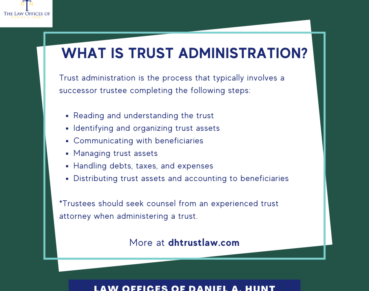How to Liquidate Assets Post-Death

“What do I do with all this “stuff”?” If you’re a trustee or estate executor/personal representative, you may initially feel a bit overwhelmed by the idea of distributing all of the “stuff” that the decedent accumulated over a lifetime. Here are some tips on how to get started in the process of liquidating assets post-death.
What is “Liquidating Assets”?
“Liquidating” assets means converting hard assets (like real property and personal belongings) into cash. Liquidating assets is an essential step in any trust or estate administration that prepares you to distribute funds to the beneficiaries and complete the administration.
Which Assets Must Be Liquidated?
There are 3 main types of property that need to be liquidated after a death:
- Real Property: This category includes any real estate the decedent owned, including any partial shares they may have owned with other parties.
- Tangible Personal Property: This category includes automobiles, furniture, family heirlooms, clothing, jewelry, firearms, collectibles – basically, all of the “stuff” at the residence.
- Intangible Personal Property: This category includes stock certificates, bonds, and CDs.
How to Liquidate Assets
Let’s walk through three steps to liquidating assets.
Step 1: Collect and inventory all estate property.
As the trustee or estate administrator, you’ll want to change the locks on any real property and make sure that beneficiaries do not take anything from the estate until you have properly inventoried the estate assets. And of course, do not take anything from the estate yourself until the inventory is complete.
step 2: Verify the value of all estate assets.
As a trustee, you have a duty to manage the trust assets wisely. You don’t want to make the mistake of donating a rare, collectible coin worth thousands of dollars to Goodwill. A mistake like that would rob the beneficiaries of a portion of their inheritance.
If you know or suspect that a trust asset is valuable, you should seek to have it appraised by an experienced professional. Here are some tips to help you get started:
Real estate: Hire a real estate appraiser. Find an impartial, licensed professional, rather than using your buddy from the golf course hoping that they will push the numbers in your favor. You may wish to ask your trust/probate lawyer for a referral.
Tangible property: If you believe the estate contains high-value pieces, you should seek out an appraiser specific to the item. For example: find a jewelry appraiser to get an accurate value on grandma’s heirloom diamond wedding ring.
Finding the right appraiser: An internet search can be a useful jumping-off point. You can try the ASA Find an Appraiser tool to find the exact appraiser specialty you need.
step 3: Sell, distribute, or dispose of the assets.
The method you use to liquidate an estate asset will depend on what kind of asset it is. but here’s one key thing to remember: all cash you collect must be deposited into the estate bank account and kept separate from your personal funds at all times. Keep careful records of all income and any distributions made throughout the estate administration process.
Here’s an overview of how to handle each category of property:
Real Estate: You will want to sell any real property through a realtor who has experience in estate administrations. You may wish to ask your trust/probate lawyer for a referral.
Avoid waiting for the real estate market to skyrocket in order to sell. This delays closing out the administration and risks the ire of beneficiaries who are waiting on their inheritance.
If a tenant is currently living in the real property, you’ll need to give them notice to vacate the property so it can be prepared for sale. If the tenant resists these requests, may need to seek the assistance of an eviction attorney. You may wish to ask your trust/probate lawyer for a referral.
If you have one or more beneficiaries who wish to keep a piece of real property as part of their inheritance, you’ll need to determine if there are enough assets in the estate to offset in-kind distributions for the property and whether the beneficiaries are open to holding title together.
Intangible Property: You may use a stockbroker to sell stock certificates. Bonds can be cashed out at a bank.
Tangible Property: Distributing tangible personal property can be sensitive. Some items may carry sentimental value for the beneficiaries. Here’s how to deal with personal property:
1. Check for a letter of instruction. If the decedent left written instructions regarding who they want to receive specific items, start by carrying out those wishes first.
2. Consult with the beneficiaries. Ask which assets they’d like to keep. Some may want items of a purely sentimental nature, such as family heirlooms or photographs. Others may wish to take items of more significant monetary value as part of their inheritance, such as a vehicle or fine jewelry. If the item taken has a known value, the beneficiary should sign a receipt documenting the transaction.
3. Sell items of value. Once the beneficiaries have taken the items they wanted, consider holding an estate sale or selling items on a website like Craigslist.
4. Donate or give away the rest. When everything of value has been sold, you may donate whatever remains to friends, a charity thrift shop, Goodwill, etc.
Liquidating assets can be a time-consuming process, but once complete, you will be much closer to closing the estate administration. Hopefully, you have hired an experienced trust/ probate law firm to coach you through the process. Check with them before making final distributions.
Feel free to contact our law firm if you have any questions regarding liquidating assets in a trust or estate administration.
Law Offices of Daniel A. Hunt
The Law Offices of Daniel A. Hunt is a California law firm specializing in Estate Planning; Trust Administration & Litigation; Probate; and Conservatorships. We've helped over 10,000 clients find peace of mind. We serve clients throughout the greater Sacramento region and the state of California.




